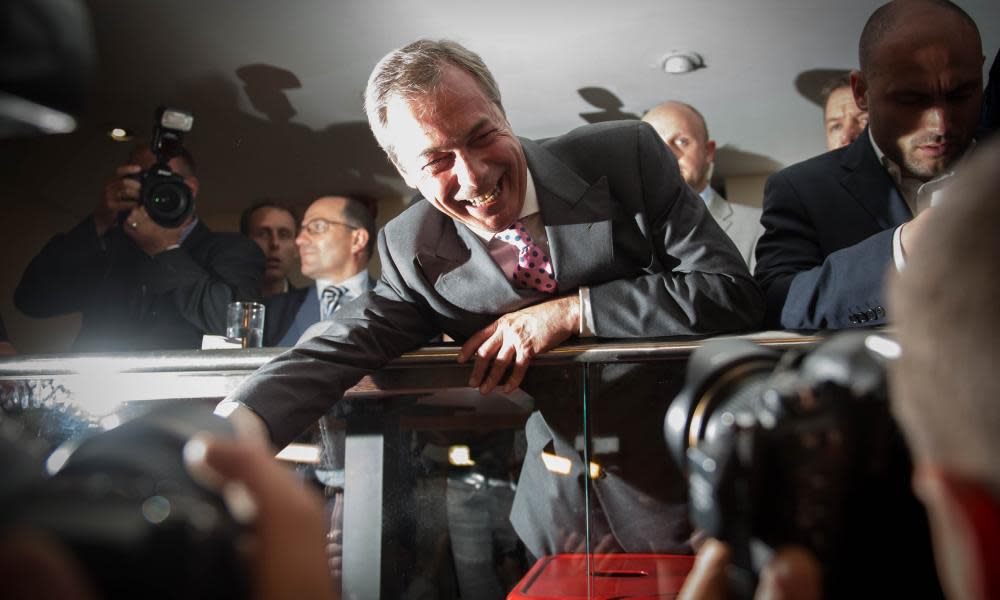Democracy dies without transparency and fairness

The concept of democracy is based on high principle, refined by centuries of political theory. But democracy is at its most observable in the processes required to sustain it; the everyday – and sometimes mundane – safeguards needed to protect free and fair elections, freedom of speech and association, and minority rights. The Observer’s report last week on how Cambridge Analytica used data harvested from millions of Facebook profiles to influence voter behaviour posed new questions about how those democratic processes can be protected in a new information age, in which data, not just money, is the powerful currency that determines whether elections are won or lost. Closer to home, our new exposé by Carole Cadwalladr this week features allegations that Vote Leave may have manipulated electoral law to get around the spending limits set by the Electoral Commission for the EU referendum.
According to whistleblower Shahmir Sanni, Vote Leave channelled £625,000 via a youth campaign he worked on, BeLeave, to the data analytics firm AggregateIQ. Sanni alleges BeLeave was not the separate, independent organisation Vote Leave claims. Sanni explained that it shared an office and, as he recalls, was effectively under its control. Such activity, if true, may amount to co-ordination under electoral law, and require Vote Leave to declare its spending as an expense.
Sanni has also given evidence to the Electoral Commission showing that the names of Vote Leave’s directors – including those currently working as advisers in No 10 – were deleted from BeLeave Google documents shortly after the information commissioner launched an inquiry last year into how the referendum campaigns used personal data, though AggregateIQ has downplayed this.
A common thread runs through these stories. It is already established that AggregateIQ is linked to Cambridge Analytica through IP agreements; this weekend, the Cambridge Analytica whistleblower Christopher Wylie alleges that the links between the two go much deeper, such that their activities became confused. But both stories also shine a light on the extent to which our electoral law, with its 19th-century roots, is unfit for purpose in this modern age.
British electoral law is based on two principles. First, that elections should achieve a level playing field in terms of resource; parties and candidates face national and local spending limits. Second, that elections should be conducted under conditions of openness and transparency: candidates have to be transparent about the material they are using to communicate with voters, and it is illegal to make false claims in that material.
Our reporting shows the extent to which the modern realities of electioneering are putting these principles under strain. The system relies heavily on parties self-reporting their spending, and the fact that campaigning material has, on the whole, been openly available; try keeping a controversial or misleading leaflet sent to thousands of voters out of the public eye.
The ability to spend large sums on micro-targeted advertising based on revealing data harvested from voters’ social media profile removes much of that transparency. If the material in question goes unseen by the vast majority of voters, it becomes harder to track exactly what a party is putting out, so easier to put out false claims, and for spending to go undeclared, particularly when the money is channelled through little-known intermediaries. Social media platforms are overtaking the national and local press as the channels through which politicians communicate with voters, but they perform that function without the same level of scrutiny, regardless of their own ideological or business interests. Anomalies abound. Broadcast advertising is banned; yet advertising on YouTube – where videos can garner more viewers than primetime television – is unlimited so long as it is within spending limits.
But this goes beyond the regulation of democratic processes, to the very nature of democracy itself. Public deliberation and debate are the lifeblood of a healthy, functioning democracy: this manifests itself in parties that run campaigns with broad appeal; in wide-ranging, public platforms that provide a basis on which voters can hold governments to account.
The trend towards micro-targeting risks moving us further away from the democracy of the public forum, towards a fractured, individualised democracy in which “swing voters” are targeted based on narrow issues, using false claims or under-the-radar dog-whistling that are not subjected to public scrutiny. Meanwhile, voters seen as already decided, or insignificant to the result, go ignored.
We don’t know how effective Cambridge Analytica’s efforts were at changing voters’ minds. We don’t know whether the extra spending Vote Leave channelled via BeLeave helped swing the referendum result. Clearly, the poll revealed deep schisms within Britain, fuelled by discontent with the status quo among the electorate. Those sentiments were not manufactured by malevolent actors deploying subterfuge.
The Observer has made no secret of its belief that Brexit is not in the national interest. But asking questions about transparency and fairness is driven not by a partisan wish to overturn a referendum result, but the desire for a critical debate about whether our electoral laws, and ultimately our democracy, remain fit for purpose. Left or right; remain or leave: this debate concerns democrats from all political traditions.

 Yahoo News
Yahoo News 
